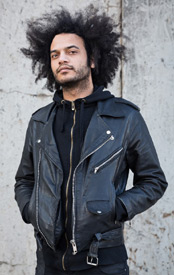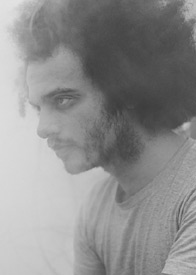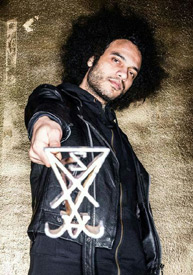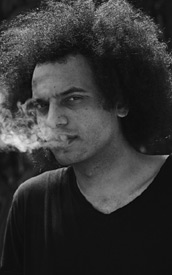|
Interview conducted May 24 2018 Interview published June 6 2018 |
![]()
Regarding choice of music style: "Actually it was a suggestion from the internet. Strictly put: not even my idea."
Zeal & Ardor put out its second record Stranger Fruit on June 8th and as the man behind this whole project, Manuel Gagneux, came to Stockholm, Metal Covenant managed to score some time with him.
![]()
Tobbe: What subjects does your new record Stranger Fruit deal with?
Manuel: A couple of them. I mean, it's always kind of pretentious when artists talk about their album and they say like "It's about World War 2." and you're like "No. That's just a rock album. Fuck you!". [Laughs] But to me it's about departure and going somewhere and not coming back. And I use a lot of, like, occult and satanist imagery to kind of play with the subject of the political climate in the US. And I'm aware of, that that sounds, like, bizarre and maybe it's just, you know, my impression of the album and no one really else thinks of it that way, and that's totally fine.
 Tobbe:
Tell me about the sonic improvement on the new album, in comparison to
the first record.
Tobbe:
Tell me about the sonic improvement on the new album, in comparison to
the first record.
Manuel: The first one I did by myself, and I have to admit, after completing it, that I'm probably not the best sound engineer in the world. [Laughs] So I had a lot of time to think about how it should sound and I was approached by Zebo Adam, the co-producer of the record, and we were thinking a lot about the drum sound and oddly enough we were thinking of the same example and that was a Kvelertak album, the first one, and we googled it "Who mixed this?" and it was Kurt Ballou.
Yeah, those two guys have far more patience when it comes to, like, sonic qualities. They listen to vinyl; I listen to shitty MP3s, so it speaks volumes. [Laughs] And I think it shows. Yeah, there's no comparison between the two records.
Tobbe: You're staying with kind of the same atmosphere on this record, like with two main styles of music and a little bit more added to it of course, and what makes you decide putting those styles together?
Manuel: Actually it was a suggestion from the internet. Strictly put: not even my idea. I played this game where I would go online and ask people to name musical genres and I would take two suggestions and make a song of it in 20 minutes. So I did, like, 30 of those and one day a guy says "Black music…", or he said it differently [Laughs] "…and black metal." and I thought it was really interesting. I mean, black metal tries to be as far gone from its black roots as possible and I think bringing them back together is like closing the circle.
Tobbe: We talked over the phone last year and then you told me that your music is kind of a result of experimenting and does that go for the new record as well?
Manuel: Yeah. You know, you would be forgiven to think that it's kind of restrictive to have these elements, but there's so much, like, room for experimentation in both elements and I see that the first record, Devil Is Fine, is kind of a proof of concept, like "This could work." and this time it's more like "Okay. I have these elements. What can I do with it?".
So I kind of go more into, like, this souly or even R&Bish stuff or jazzy stuff and on the other side I go into, like, thrash metal, proper black metal and even, like, some baby prog stuff, 'cause I'm not that technical. [Laughs]
Tobbe: This is a record you definitely have to listen to to understand it, but have you seen any reviews of the album that can actually describe the feeling of it?
Manuel: You know, I try not to read reviews, 'cause, I mean, there's like two possibilities: That I read it and they say it's really great and I, like, have an inflated ego, or they say it's total shit and I'm crushed for the rest of my life. So I'm just: Fuck it! Hands off! [Laughs]
Tobbe: From where do you get your influences, in the different genres, to create this kind of music then?
Manuel: For the spiritual stuff it's old recordings by Alan Lomax, who was, like, a musicologist, and he would collect all these field recordings and for the metal stuff it's all sorts of stuff. I really enjoyed that Nails record from last year [You Will Never Be One Of Us, 2016]. I still enjoy Darkthrone and Emperor a great bit. Gojira, [The] Dillinger Escape Plan, Cannibal Corpse, anything I can get my grubby hands on.
Tobbe: When you compose these songs, do you kind of see pictures in front of you, like a movie or something like that?
Manuel: I do, and that's kind of what I want the audience to envision themselves to. So I don't, like, have a story going on, but, like, set dressing is my go, so I make a stage for the listener to have their own story.
Tobbe: Sitting there in your home, and composing, what kind of mood are you in?
Manuel: It really depends on the song. I mean, if I was totally stoic, like [Grunts] "Okay, this is an emotional song.", it wouldn't work, so I have to kind of lose myself in the music. But it's not as romantic as… I mean, I don't, like, light candles and put in, like, pig's blood so I can smell it. It's just: I sit there in my underwear, basically, in front of a computer. [Laughs]
 Tobbe:
To what extent are the lyrics just fiction and to what extent are the
lyrics reflecting yourself? But maybe written from a different viewpoint
of course.
Tobbe:
To what extent are the lyrics just fiction and to what extent are the
lyrics reflecting yourself? But maybe written from a different viewpoint
of course.
Manuel: The intention was that it can be read in two ways. That first of all it's like this fiction of, you know, back in the day when slaves would revolt against their masters. For instance, with a song like Servants: That could be in a plantation 1830, or whatever, or it could be a call to action to the American middle class right now. So it's ambiguous. I know that's pretentious, but… sticking with it. [Laughs]
Tobbe: Your voice: Sometimes it's emotional and sometimes it's kind of normal, I would say, and sometimes harsh and how do you personally look at each different pitch or tone?
Manuel: I just kind of try to figure out what works best for that line or for that song. It also goes with languages; for instance, I use German sometimes, just because sonically it's far harsher. I guess German's like playing drums, 'cause there's so many consonants and [makes sounds like sch, ch, tz]. Yeah, it depends on the song.
Tobbe: Devil Is Fine was made pretty much by yourself alone, but now there's a record label backing you up, so what stuff did you get some help with or maybe was done by someone else this time?
Manuel: Well, I did all the demos alone and I went into the studio just to re-record the guitars properly. The guitar tone I had help with. Also with, like, micing the drums; I don't know the first thing about that. And also the drums were played this time. With the first record it was, like, programmed and this time Marco von Allmen, who also plays live with us, recorded the drums.
At some points I programmed the drums and I was like "Oh fuck. This is like: kind of teasing him." and then he listened to the track and he was like "Fuck yeah!". [Laughs] But he got the job done; he's a brilliant drummer.
 Tobbe:
And with a record label behind you there's always some kind of pressure
to put out something of course and did this fact made you even be more
creative or did it at some point stifle you as well?
Tobbe:
And with a record label behind you there's always some kind of pressure
to put out something of course and did this fact made you even be more
creative or did it at some point stifle you as well?
Manuel: At first I was kind of stressed, 'cause, you know, with the first record I didn't have an audience to think of or, like, expectations, but then I kind of realized what makes the first record work, for me at least, and it was that I didn't think about an audience; I just made music that I personally liked, and I tried as best I could to do that again. But of course it's impossible. I mean, you can't, like, think away the audience, but I got as close to that point as I could.
Tobbe: This record is, kind of like we said, sonically more clean and was that kind of the first thing you talked about with the record company, to make it a more professional record?
Manuel: Yeah. Because I could have done the same stuff again. I recorded all the songs basically at the quality of the last record and, I mean, I have the possibility to make it better, so just to put it out in the same shitty quality would be lazy and kind of like mean to the audience, or the fans. So, might as well…
Tobbe: The first record was pretty short [25 minutes] and this one is way longer [48 minutes] and was that something you also thought about when you were recording?
Manuel: Yeah. I mean, the only comments I read are, like, the bad feedback, 'cause that sticks with you, but most of it is kind of true. Okay, if someone says "I just hate…", that's just an opinion, but if they say that the production is bad, I have to say "Yeah, he's kind of right.". [Laughs] And if they say it's super short, I have to say "He has a point there.". I mean, I went into the studio with, like, 37 songs and we kind of boiled it down to these 16. Yeah, I mean, it's 16 songs, but it's still under an hour long, so I guess it's a good middle ground, I think.
 Tobbe:
So, tell me a little bit about your musical background.
Tobbe:
So, tell me a little bit about your musical background.
Manuel: I didn't have any, like, proper schooling; I was just fucking around. But both my parents are musicians. My mom is a jazz singer and my dad plays percussion and guitar in a salsa band, which is why I hate salsa; can't listen to it. [Laughs] No, it's really, like, technical music and I just can't enjoy it. It's like aggressively happy. But yeah, we always had a piano in the house and I could, you know, play around with it. That was super important, I think.
Tobbe: So you learned the basics on piano and then you evolved your skills to different kinds of instruments too. So how did that process work for you when you were young?
Manuel: I think, like, the biggest lesson I had was not having a girlfriend as a teenager, so I could concentrate on the guitar. [Laughs] Yeah, and I mean, I started to listen to metal music and of course, being like a 14 year old, like: the faster it gets, it's, like, the best. So I listened to all this technical, wanky stuff like Dream Theater and tried to play that and stuff like that.
Tobbe: And to what extent are parents, siblings and friends part in your choice of musical style?
Manuel: It's hard to say, but I think it's pretty big. My friends actually introduced me to metal and to black metal. Yeah, I guess a big part of my circle of friends is kind of based around this music thing. I have a venue with some friends of mine and we do the booking together and we nerd out around music nonstop. Guess it would be pretty annoying for someone to sit with us. [Laughs]
Related links:
www.zealandardor.com
www.facebook.com/zealandardor
![]()